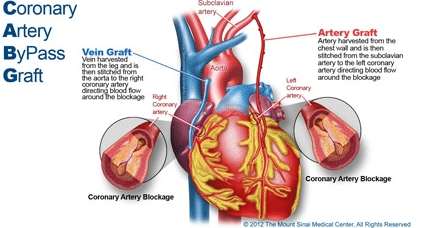Guidance for CAD, Heart Patients undergoing CABG
What is CABG?
CABG or Coronary Artery Bypass Grafting is a surgery done to improve blood flow to the heart. In most instances there is a fatty plaque (CAD or Coronary Artery Disease) in the vessels of heart which reduces the blood flow required for normal function. The plaque may grow or harden with time and reduces oxygen-rich blood reaching the heart. Lowering of the amount of oxygen reaching the heart may result in Chest Pain - called Angina. The plaque may even rupture and form clots on its surface. The clot formed may mostly or even completely block the blood flow - leading to Heart Attack or Myocardial Infarction.
In CABG, a normal vein or artery from the patient's body is connected to the blocked coronary artery. Thereby bypassing the obstructing plaque and creates a new path along which blood can now reach the heart.
What are other options for Treatment of CAD?
Other than CABG options for treatment of CAD include - Lifestyle changes, Medications, PCI or Balloon Angioplasty.
PCI is a nonsurgical option where the blocked artery can be opened and generally a stent is placed at the point of blockage to keep the blood flowing.
Goals of CABG
CABG is done to achieve the following
1. Reduce the symptoms (Chest Pain, Breathlessness etc)
2. Improve quality of Life and helps to resume a more active Lifestyle
3. Improved pumping action of the heart
4. Reduce chances of Heart Attack
5. Improve chances of survival
Who needs CABG?
CABG is a surgical treatment for CAD.
Your doctor may recommend CABG if other treatments have not worked or he judges it good in his clinical opinion.
Decision will be based on factors such as -
1. Severity, Location and number of blockages
2. Response to other treatments
3. Your quality of Life and severity of symptoms
4. Other Medical conditions that you might have
5. Your Age and Medical History
Medical Tests that may be required to determine the need are -
1. ECG
2. Echocardiography
3. Coronary Angiography
THE SURGERY
Outlook
CABG is a relatively safe Surgery. The safety of the procedure will depend on your age, existing heart function, and experience of the Doctor.
What to expect before
You will need to undergo a few tests to prepare you for CABG such as - Blood tests, Chest X-Ray, ECG, Echocardiography or maybe Coronary Angiography. Doctors that perform CABG are Cardiothoracic Surgeons.
Things to ask your Doctor at this Stage -
1. What you can eat or drink
2. What activities are you allowed to do (e.g. smoking)
3. What medicines to take (Share all the medicines that you are taking for any other conditions)
4. As the outlook for surgery is heavily dependent on the number of procedures a Doctor has performed - it will be a good idea to get information about his clinical experience.
If you have already undergone all the tests - surgery may be done on the same or a day after the admission.
What to expect after
You will require admission into ICU typically for 1 or 2 days, to monitor your progress better after the surgery. You will be given oxygen therapy while hospitalized. You may also be asked to wear Compression Stockings while your movement is limited.
After you leave ICU you will require admission in the hospital for about 4 - 6 days.
Recovery at Home
Things to ask your doctor before leaving the hospital.
1. How to care for incision wounds and stitches.
2. How to identify signs of infection
3. How to identify conditions for which you need to call the Doctor right away.
4. When to make follow-up appointments
Common side effects of CABG wear off within 4 - 6 weeks but may include.
1. Discomfort in area from where the vein was taken
2. Itching and swelling at incision wounds
3. Fatigue, Loss of Sleep, Loss of Appetite
4. Constipation
Full recovery from CABG takes 6 - 12 weeks.
Your doctor will advise you when you can resume specific activities. If your work is not too demanding physically, it is common to return to work after 6 weeks. You can resume sexual activities after 4 weeks and drive after 4 - 8 weeks.
Ongoing Care
At you follow up visits you will require to undergo tests such as ECG, Echocardiography etc. to see how much your heart has improved. CABG is not a cure for CAD. A complete Treatment will always involve Lifestyle changes, Reducing weight, Medications, and Cardiac Rehabilitation Exercises. Your doctor will prepare a treatment plan for you including these things. Be sure to pay attention to them as religiously as your Surgery.



+1.svg)
